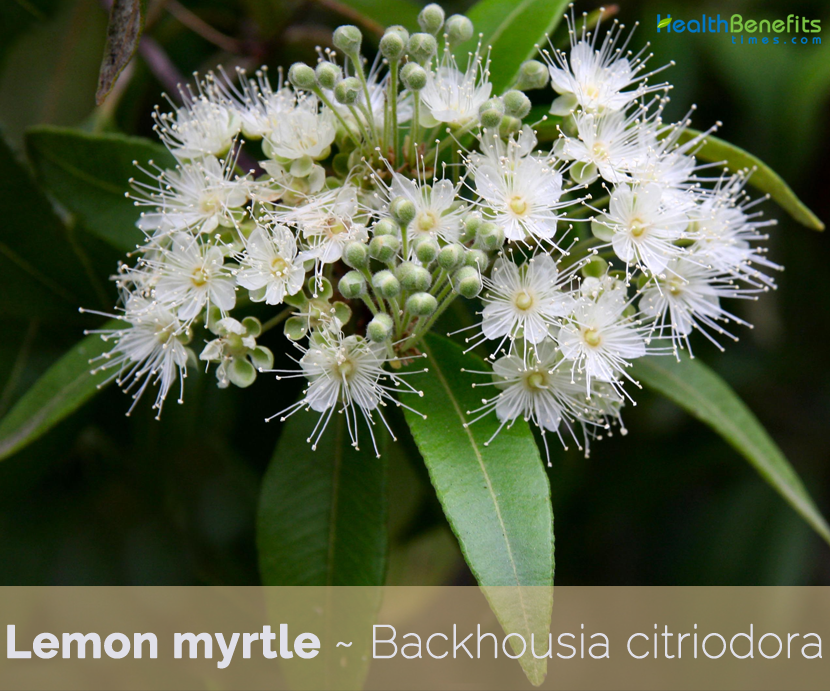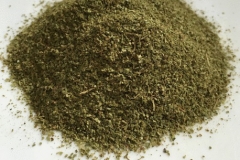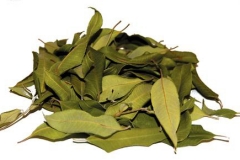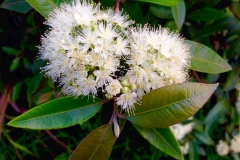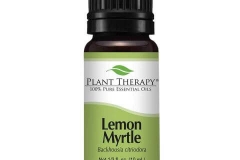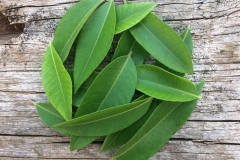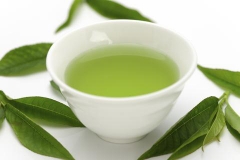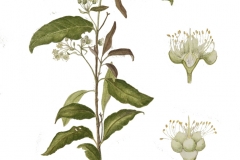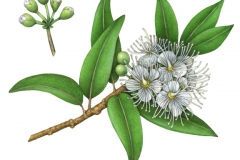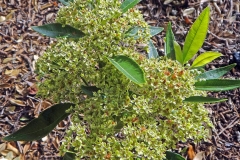Plant description
Lemon myrtle is a relatively slow-growing, aromatic, evergreen tall shrub or small tree that sometimes grows up to 20 meters tall in the wild, though usually smaller and rarely above 5 meters in cultivation. The plant is found growing in coastal forests, rain forests and semi-temperate rain forests. The plant prefers humus rich, moist, well drained, well composted fertile soil but tolerates clay soils and improved sandy soils. The plant has thin, grey or light-brown, rough and fissured, sometimes flaking bark. Often in cultivation small branches take root where they touch the ground. These branches are easily severed and replanted.
The common name reflects the strong lemon smell of the crushed leaves. “Lemon scented myrtle” was the primary common name until the shortened trade name, “lemon myrtle”, was created by the native foods industry to market the leaf for culinary use. Lemon myrtle is now the more common name for the plant and its products. Lemon myrtle is sometimes confused with “lemon ironbark”, which is Eucalyptus staigeriana.
It comes in many forms and can be taken in a variety of different ways so you are not limited to a boring routine. It can be used in cooking to spice up a recipe, taken as a tea or applied topically in the form of essential oils. Its rich lemon aroma is both pleasant and soothing. Lemon myrtle is used to treat a diversity of ailments from throat disorders to gastric problems, and it is sold in many health and supplement stores
Leaves
Leaves are fresh green color and strongly lemon-scented. They are attractively veined and oval or lance-shaped in outline, 50 -100 mm long with slightly toothed margins and a pointed apex. Young foliage is reddish and the young shoots and undersides of the leaves are often hairy.
Flower
The very attractive white flowers are numerous and produced in long-stalked clusters. Outer part of an individual flower consists of a bell-shaped hairy receptacle with 5 persistent spreading calyx lobes. These are overcome by 5 small petals about 5 mm long and numerous fluffy stamens which are twice as long as the petals.
Fruit
Fruit is a nut-like capsule which consists of several small seeds. These are occasionally released but are generally retained until the whole fruit fails from the tree. B. citriodora is somewhat frost-tender when young but can be grown outside in frosty areas provided it is planted in a sheltered position in semi-shade.
Health benefits of Lemon Myrtle
Apart from food it is used in skin care products like lotions, lip balms, etc. It is also used in hair care products like shampoos and conditioners. It is extensively used as beverages like tea due to its therapeutic values. Following are the health benefits of lemon myrtle
1. Indigestion and Irritable Gastrointestinal Disorders
Lemon myrtle has been found beneficial in treating indigestion and gastrointestinal disorders like bloating, etc. Certain properties of lemon myrtle help in stimulating the digestion process. You can consume lemon myrtle in oil form, grounded form, as a spice or tea.
2. Bronchitis
Lemon myrtle essential oil has been found effective in the treatment of bronchitis. Since bronchitis is the inflammation of the mucous membrane in the bronchial passage, the use of lemon myrtle oil can decrease the inflammation as well as fight the infection, which is the cause of bronchitis.
3. Influenza/ Flu
Anti-viral property of lemon myrtle helps in treating influenza as well. Taking steam with few drops of lemon myrtle oil or leaves may help you in fighting influenza.
4. Boosts Immune System
Healthy immune system means fewer health issues because of a stronger immune system that is vital to combat diseases. Consumption of lemon myrtle fortifies your immune system, thus providing you protection against several health issues. You can use lemon myrtle in the form of tea, powder or oil for benefitting your immune system.
5. Molluscum Contagious
Molluscum contagious is a viral infection of the skin that causes red colored bumps or lesions on the skin. Research has shown that Lemon Myrtle is a natural way of treating molluscum contagious. The anti-viral property of lemon myrtle makes it a remedy to treat molluscum contagious.
6. Sinus Infection
If you are having sinusitis problem, then Lemon myrtle oil can be of great help. This is because lemon myrtle has anti-inflammatory properties that help in reducing the inflammation of the nasal passage while its anti- infection property combats infection that causes sinus problem.
7. Oral Health
Lemon myrtle can be helpful in treating oral health issues like ulcers, irritation, tooth problems, etc. The use of this herb cleanses the mouth thus providing protection from various infection causing bacteria and viruses. You can add lemon myrtle powder in your toothpaste for regular use. It can also be used in tea.
8. Better Sleep
Lemon myrtle is mostly beneficial for those who cannot sleep peacefully. The relaxing effect of this herb can calm your mind and promote peaceful sleeping. For this purpose you can bath by adding lemon myrtle oil in a bathtub before going to sleep or drink lemon myrtle tea before bed.
9. Shiny Teeth
Everyone loves a beautiful smile with pearly white teeth which shines like a set of pearls. Now you can have one with the help of lemon myrtle. Lemon myrtle toothpaste is very effective in removing the yellowness from the tooth making it clear white. It cleanses the mouth and removes various infections and bacteria’s infesting inside the mouth. Lemon myrtle oil can also be rubbed on the tooth with circular motion after brushing giving it added shine and polish.
10. Rheumatoid Arthritis
Rheumatoid Arthritis is one of the common bone joint problems faced by people. It is an inflammatory disorder that results in painfully swelled joints. The anti-inflammatory property of lemon myrtle helps in reducing inflammation and gives relief. In case of rheumatoid arthritis, you can massage your joints with lemon myrtle essential oil for relief.
11. Sore Throat
Sore throat can be very painful and hard to bear. The antiseptic, anti-inflammatory and antibacterial properties of lemon myrtle help in treating sore throat by killing bacteria and reducing inflammation. You can take lemon myrtle essential oil with honey for relief from sore throat.
12. Fights Bad Odor
Refreshing aroma of lemon myrtle helps you in getting rid of bad body odor and bad breath. Its anti-microbial property prevents body odor by killing odor causing microbes. You can add lemon myrtle oil to your bathtub or apply a few drops of it to your body. To get rid of bad breath, you can add a few drops of lemon myrtle oil to water and gargle it.
13. Acne
Acne is a big problem, mainly for girls. Lemon myrtle is a wonderful natural remedy for acne problem. It is helpful in treating oily skin that is one of the main causes of acne. Use of lemon myrtle essential oil can help you in getting rid of acne. You can add its oil in your lotion also.
14. Athlete’s Foot
Athlete’s foot is a fungal skin infection, which causes scaly, red itchiness in the foot sole and between toes. The anti-fungal property of lemon myrtle fights this infection by killing such fungus.
15. Depression
Lemon myrtle can be your stress reliever. It provides a calming effect by inducing better sleep, promoting relaxation, filling you with positive feelings, etc. You can massage your foot with lemon myrtle oil. It can be added in aromatic lamps as its aroma soothes the mind and uplifts the mood.
16. Antioxidant
Lemon myrtle has antioxidant properties that remove free radicals from your system. This protects cells from getting damaged, as well as prevents brain aging, cancer, tumors, heart diseases, etc.
17. Headache
If you are troubled by headache, lemon myrtle can help in providing relief. The soothing aroma of lemon myrtle causes headache. You can inhale steam by adding lemon myrtle for a headache remedy. Another way of treating headache is to massage your temples with lemon myrtle essential oil.
18. Asthma
Lemon myrtle helps in combating asthma. Asthma is a lung disease in which the air passage swells and narrows causing difficulty in breathing. Steaming with lemon myrtle in water can be helpful in easing asthma problems.
19. Elimination of Accumulated Mucus and Phlegm
Occasionally our body starts producing excess mucus and phlegm due to cold, flu or infection. This phlegm gathers in the lungs and respiratory passage causing difficulty in breathing. Steaming with a few drops of lemon myrtle oil in water can be helpful in this regard by removing excess accumulated phlegm and mucus.
20. Cramps
Cramp can be defined as an involuntary muscle contraction which causes pain. Lemon Myrtle helps in reducing the muscle cramps and menstrual cramps. Chemicals found in it help the muscles to relax, thus reducing the cramp to a significant extent.
21. Insect Bites
Lemon myrtle oil can be used to treat insect bites. Its application calms the affected area and also reduces inflammation. Lemon myrtle can also be added to any lotion to prevent insect bites as it acts as an insect repellant because of its strong aroma.
https://www.youtube.com/watch?v=r4PrZOPJt10
Other Different Uses
Lemon myrtle has a ton of different uses, among which include the following:
Food recipes
In addition to enhancing the flavor of beef, chicken, fish and rice dishes, lemon myrtle can be used in recipes for making breads, sauces, dips and pancakes. It can also be used in desserts like cakes and muffins to satisfy a sweet tooth. The lemon myrtle should not cook for more than 15 minutes, however. It can develop an unpleasant bitterness if it is exposed to high temperatures for too long.
Beauty products
Lemon myrtle essential oil can be found in many personal care products like body lotions, lip balms, soaps, shampoos and conditioners. Its scent has a soothing effect that helps promote relaxation and better sleep. It also thought to repel fleas, making it an ingredient in some pet shampoos, as well.
Beverages
As previously mentioned, lemon myrtle makes a great antioxidant herbal tea, which can be served hot or cold. In fact, this is one of lemon myrtle’s most popular uses.
Culinary Uses
- The plant is often used as a flavoring and to make a refreshing tea, it has become widely used in the gourmet bush food industry.
- Leaves and flowers of lemon myrtle are used in tea blends and beverages, biscuits, breads, confectionery, pasta, syrups, liqueurs, flavored oils, packaged fish (salmon), and dipping and simmer sauces.
- It has a range of uses, such as lemon myrtle flakes in shortbread; flavorings in pasta; whole leaf with baked fish; infused in macadamia or vegetable oils; and made into tea, including tea blends.
- It can also be used as a lemon flavor replacement in milk-based foods, such as cheesecake, lemon flavored ice-cream and sorbet without the curdling problem associated with lemon fruit acidity.
Recipes
Lemon Myrtle Cheesecake
Ingredients for Base
- 1 Tablespoon Wattle seed
- 1 cup plain flour
- ½ cup sugar
- 1 cup macadamia nuts
- 120 ml Macadamia Oil
Ingredients for Filling
- 2 Tablespoons Lemon Myrtle
- 500 gm. cream cheese
- 1 cup sugar
- 3 large eggs
Direction
- Blend all the above-given base ingredients and bake them in a preheated oven at 180 degrees.
- After baking, let this crust rest until it cools down at room temperature.
- Now blend all the filling ingredients until the batter gets fluffy and smooth.
- Pour this batter into the crust and bake again for 20 minutes.
Lemon Myrtle and Macadamia Biscuits
Ingredients
- 200 g margarine
- 100 g white sugar
- 225 g macadamias, whole or chopped
- 225 g self-raised flour
- 1 tsp ground lemon myrtle
Directions
- Blend margarine and butter.
- Add macadamias and mix until they distribute evenly in the mixture.
- Add ground lemon myrtle and flour to make the resulting mixture crumbled, sticky and easily moldable.
- Make flat balls using this mixture and bake them for 15-20 minutes until you get golden brown colored biscuits.
Crispy Prawns with Lemon Myrtle
Ingredients
- One tablespoon Lemon Myrtle Ground
- One teaspoon Paprika Smoked, Sweet
- Chili Powder, optional
- Salt
- 1/2 cup cooking oil
- Two fresh chilies, finely chopped
- Lime wedges for serving
Directions
- Toss or marinate the prawns with a mixture of rice flour, lemon myrtle powder, paprika, chilli powder and salt.
- Heat oil in a frying pan and cook the prawns until they become crispy.
- Drain on an oil absorbent paper and serve hot with lemon wedges.
Lemon Myrtle Shortbread
Ingredients
- 2 cups plain flour
- 2 tablespoons rice flour
- 1/2 cup white sugar
- 1 teaspoon Ground Lemon Myrtle (or 2 tsp if you prefer stronger flavor)
- 220 g unsalted butter softened
Direction
- Sieve all the ingredients except butter.
- Mix them well.
- Then add butter and make small balls.
- Now roll these balls flat (1 cm).
- You can give the desired shape to these by using a cutter.
- After this, put them on a baking tray or use baking paper or grease tray.
- Bake them at 60°C for 25- 30 minutes.
- Serve them when they cool down.
Side Effects of Lemon Myrtle Tea
Lemon myrtle tea is also not an exception since it too arrives with some effects. The side effects of this tea are:
1. Dehydration
Lemon myrtle tea is absolutely capable of causing dehydration in the body, and this may appear due to drinking such tea quite frequently. In some situations, this kind of liquid works as an excellent diuretic. It creates a frequent urge to urinate by triggering dehydration in the human body.
2. Tooth Erosion
Lemon myrtle tea works silently in eroding the enamel of your teeth. Due to this, your teeth become vulnerable to a sharp pain and turn sensitive while tolerating strong changes in temperature. People drinking this tea on a regular basis start showing symptoms of enamel erosion in the teeth.
3. Stomach Issues
Irritable bowel symptoms, stomach ulcer, constant ache, diarrhea, etc. are often the issues with people who consume lemon myrtle tea daily. If you have any physical issues related with the stomach, talk to your dietitian about consuming this tea.
4. Pimples and Acne
Lemon Myrtle is useful for helping to clear annoying pimples and acne from the face and body. It helps with keeping the skin clean and decreasing the amount of oil that is produced by the skin. The anti-microbial and anti-inflammatory properties are excellent for killing the bugs which are causing the pores to get infected and reducing the inflammation which they cause. Tea can be made and allowed to cool till it is luke warm, then Celtic sea salt or normal sea salt is added to the water and used as a face wash.
5. Harmful For Babies
Lactating mothers should remain at a safe distance from lemon myrtle tea. The caffeine present in this tea mixes completely with the breast milk and can cause harm to a suckling kid. So, breastfeeding women must not consume this, even though they find it quite refreshing.
6. Harms Pregnant Women
Caffeine in lemon myrtle tea can even cause an expecting lady to experience a nightmare like a miscarriage if she takes too many cups of this tea in a day.
7. Heart Burns
Too much consumption of this refreshing drink is capable of altering the usual pH level in the human intestine and stomach. Consecutively, it will create acidic reflux, and the produced acid would reach up to the esophagus from the stomach. Gradually, you will start experiencing a burning sensation in your chest and would feel like vomiting.
8. Osteoporosis
Osteoporosis is one of the most dangerous diseases in human beings, and this can get triggered by lemon myrtle tea. Through urine, it silently washes away huge amounts of calcium from your body and makes your bones unbelievably weak and fragile.
9. Canker Sores
Lemon myrtle tea, when consumed largely, can easily create havocking issues inside your mouth. It badly annoys the mucous membranes and unluckily, causes canker sores.
10. Increases Chances of Alzheimer’s
When you consume lemon myrtle tea in a large quantity daily, there are high chances that you might get afflicted with Alzheimer’s disease in the future, mainly in the old age. Daily intake of this energizing tea may cause accumulation of plaques in the human brain that have directly been associated with causing Alzheimer’s.
11. Other Diseases
Lemon myrtle tea is also the reason of various other physical diseases and troubles. It causes multiple diseases like microcytic anaemia, aplastic bone disease or osteomalacia, hiked left ventricular mass, encephalopathy, frequent infections, decreased myocardial function and, sometimes, even sudden death.
References:
https://davesgarden.com/guides/pf/go/58262/
https://www.drugs.com/npp/lemon-myrtle.html
http://www.anbg.gov.au/gnp/gnp14/backhousia-citriodora.html
https://en.wikipedia.org/wiki/Backhousia_citriodora
https://www.cs.mcgill.ca/~rwest/wikispeedia/wpcd/wp/l/Lemon_myrtle.htm
http://anpsa.org.au/b-cit.html
Comments
| Lemon myrtle Quick Facts | |
|---|---|
| Name: | Lemon myrtle |
| Scientific Name: | Backhousia citriodora |
| Origin | Central and south-eastern Queensland, Australia |
| Colors | Brownish |
| Shapes | Nut-like woody seed capsule about 2 mm long |
| Taste | Sour |
| Health benefits | Indigestion and Irritable Gastrointestinal Disorders, Bronchitis, Influenza/ Flu, Boosts Immune System,Molluscum Contagious, Sinus Infection, Oral Health, Better Sleep, Shiny Teeth, Rheumatoid Arthritis, Sore Throat, Fights Bad Odor, Acne, Athlete’s Foot, Depression, Antioxidant, Headache, Asthma, Elimination of Accumulated Mucus and Phlegm, Cramps, Insect Bites |
| Name | Lemon Myrtle |
|---|---|
| Scientific Name | Backhousia citriodora |
| Native | Subtropical rainforests of central and south-eastern Queensland, Australia, with a natural distribution from Mackay to Brisbane |
| Common Names | Lemon scented myrtle, Lemon Ironwood, Sweet verbena tree, Sweet verbena myrtle, Lemon scented verbena, Lemon scented Backhousia, Lemon myrtle, Lemon scented ironwood |
| Name in Other Languages | English: Australian lemon myrtle, Lemon ironwood, Lemon-scent backhousia, Lemon-scent myrtle, Lemon-scent verbena, Sweet verbena myrtle, Sweet verbena-tree French: Myrte citronnée, Myrte citron German: Zitronenmyrte Swedish: Citronmyrten |
| Plant Growth Habit | Relatively slow-growing, aromatic, evergreen tall shrub or small tree |
| Growing Climates | Coastal forests, rainforests, semi-temperate rainforests |
| Soil | Prefers humus rich, moist, well drained, well composted fertile soil but tolerates clay soils and improved sandy soils |
| Plant Size | Sometimes growing up to 20 meters tall in the wild, though usually smaller and rarely above 5 meters in cultivation |
| Bark | Thin, grey- or light-brown, rough and fissured, sometimes flaking |
| Leaf | Evergreen, opposite, lanceolate, 7–12 centimeters (2.8–4.7 in) long and 1.5–2.5 cm (0.59–0.98 in) broad, lime green when young, becoming dark green and have a strong lemon fragrance when crushed. They remain on the tree throughout the year |
| Flower | Creamy-white, 5–7 mm (0.20–0.28 in) in diameter, produced in clusters at the ends of the branches from summer through to autumn, after petal fall the calyx is persistent |
| Fruit Shape & Size | Nut-like woody seed capsule about 2mm long which contains several small seeds |
| Fruit Color | Brownish |
| Propagation | Seed, Softwood cutting, Semi hardwood cutting, Layering |
| Flavor/aroma | Lemon-like odor |
| Taste | Sour |
| Plant Parts Used | Leaves (fresh or dried) |
| Traditional Medicinal Use |
|
| Health Benefits |
|
| Special Uses | Edible, Tea, Fragrant oils, Street tree, Erosion control, Honey producing plant, Pollution tolerant, Playground friendly |
| Side Effect |
|


